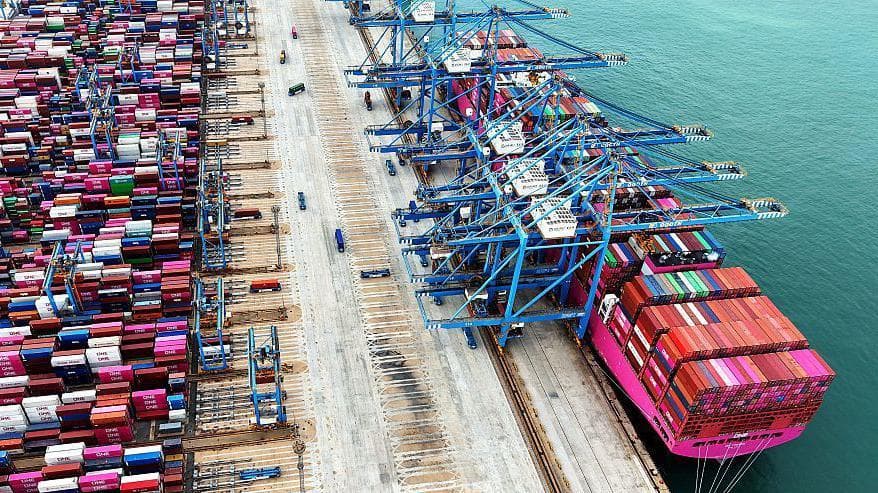We're loading the full news article for you. This includes the article content, images, author information, and related articles.
Kenya, a key trading partner for both economic giants, faces potential ripple effects from the renewed US-China trade war, impacting local industries and consumer costs.

Nairobi, Kenya – China has strongly criticised the United States' latest threat to impose an additional 100% tariff on Chinese goods, labelling it a "typical example of US double standards." This condemnation, issued by a spokesperson for China's Ministry of Commerce on Sunday, October 12, 2025, comes as trade tensions between the world's two largest economies escalate. Beijing has warned of unspecified "countermeasures" if the US proceeds with its tariff threat, asserting that it is "not afraid" of a potential trade war.
The renewed friction follows former US President Donald Trump's accusations on Friday, October 10, 2025, that Beijing was becoming "very hostile" by tightening its rules for rare earths exports. Trump also threatened to withdraw from a planned meeting with Chinese President Xi Jinping later this month.
The trade dispute between the United States and China has been ongoing since January 2018, when the Trump administration first began imposing tariffs to address what it termed unfair trade practices and intellectual property theft by China. While a "phase one" agreement was signed in January 2020, tensions have persisted and escalated, with the Biden administration largely maintaining the tariffs and adding new levies on certain Chinese goods. China's recent move to expand export restrictions on rare earth minerals and related processing technologies, effective from Thursday, October 9, 2025, is a significant factor in the current escalation.
Rare earth elements are crucial for manufacturing high-tech products, including electric vehicles, wind turbines, smartphones, and military defence systems. China dominates the global processing of these materials, accounting for over 90% of the world's supply. Beijing's new regulations require licenses for the export of technologies used in rare earth mining, processing, and magnet manufacturing, and even extend to foreign firms supplying rare earths produced or processed with Chinese technologies outside China.
China's Ministry of Commerce stated that its export control measures on rare earth minerals are "legitimate" and aimed at safeguarding national security and stability in global industrial and supply chains. Conversely, the US views these restrictions as "extraordinarily aggressive" and a tactic to hold the world "captive." The proposed 100% tariff by the US would be in addition to existing tariffs, which currently stand at around 30% on some Chinese goods.
Analysts suggest that these developments could influence public debate and policy execution globally, with stakeholders urging clarity on timelines, costs, and safeguards. The escalating trade war has raised concerns about its ripple effects on other nations, including Kenya, which maintains significant trade relationships with both the US and China.
For Kenya, the escalating trade tensions between its two major trading partners present both challenges and potential opportunities. Kenya relies heavily on both the US and China for imports and as markets for its exports, including tea, coffee, and flowers. A prolonged trade war could lead to a slowdown in global trade, impacting Kenyan exports.
Increased tariffs could also result in higher import costs for Chinese products entering Kenya, which could be passed on to Kenyan retailers and consumers. Conversely, the US reducing its reliance on Chinese imports could create an opportunity for Kenya to increase its exports to the American market, especially given duty-free access for certain goods under the African Growth and Opportunity Act (AGOA). However, the expiry of AGOA could subject Kenyan goods to a 10% tariff, posing a risk to industries like textiles.
Furthermore, a slowdown in China's economy due to the trade war could impact Chinese-backed infrastructure projects in East Africa, which have been instrumental in the region's development. Kenya's foreign direct investment from China has already seen a decline.
It remains uncertain whether the proposed meeting between Trump and Xi Jinping will proceed, as Trump has indicated he might cancel it. The full extent of China's "countermeasures" is also unspecified, adding to the unpredictability of the situation. While Trump softened his tone on Sunday, October 12, 2025, suggesting that "it will all be fine" and the US wants to "help China, not hurt it," the underlying tensions persist.
Observers will be closely watching for any further statements or actions from both the US and China regarding tariffs and trade restrictions. The fate of the planned meeting between the two presidents will also be a key indicator of future relations. For Kenya, the focus will be on how the government navigates its relationships with both superpowers to mitigate potential economic fallout and leverage any emerging opportunities.
Kenya's strategic dilemma in the wake of US-China trade disputes has been a recurring theme, with President William Ruto's recent visits to China highlighting the country's efforts to diversify partnerships amidst global geopolitical shifts.
Keep the conversation in one place—threads here stay linked to the story and in the forums.
Sign in to start a discussion
Start a conversation about this story and keep it linked here.
Other hot threads
E-sports and Gaming Community in Kenya
Active 9 months ago
The Role of Technology in Modern Agriculture (AgriTech)
Active 9 months ago
Popular Recreational Activities Across Counties
Active 9 months ago
Investing in Youth Sports Development Programs
Active 9 months ago